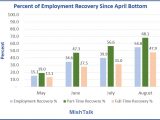Canada’s Top Cop Says Criminalizing Drugs Doesn’t Work, But He’ll Keep Doing it Anyway
September 9, 2020Canadian Public Safety Minister Bill Blair says even if criminalizing drugs is ineffective, decriminalizing them isn’t the solution either.
While Blair said in an interview Tuesday that “we don't want to see people prosecuted for simple possession of drugs.” But when asked why his government has resisted calls to just eliminate the criminal prohibitions on those drugs, Blair responded: “I disagree with your characterisation of ‘resistance.’”
In an interview with CBC last week, Prime Minister Justin Trudeau shot down calls to decriminalize drugs in the face of an opioid poisoning epidemic that continues to kill thousands.
Blair, for his part, promises that “we're looking at those sentencing provisions that currently exist that are contributing directly to overrepresentation [in prison] among indigenous and racialized populations...we want to make sure that we take the systemic discrimination and injustice out of this system.”
In recent months, a growing consensus has emerged around drug criminalization. As VICE News reported last week, British Columbia Premier John Horgan; Vancouver mayor Kennedy Stewart; the Canadian Association of Chiefs of Police; and the chief public health officers of Vancouver, B.C., the Yukon, Toronto, Montreal, and Quebec have all said it is time to stop arresting and prosecuting individuals for drug possession. Canada’s chief public health officer Theresa Tam has said that, at the very least, the country needs to have a conversation about decriminalization.
Much of the support for decriminalization has emerged from the drug poisoning epidemic and its escalation. At least 17,000 Canadians have died from drug overdoses in recent years, largely due to the increasing prevalence of powerful opiates like fentanyl in the street-level supply of heroin. Increasingly, however, cocaine and methamphetamines have driven more overdoses and deaths, especially in the Prairies.
By decriminalizing drug possession, advocates argue, drug users will be more likely to access programs that offer a safer supply of the drugs they want, or pharmaceutical alternatives. Some, like the chief public health officer of Vancouver, say the government should take responsibility for the supply to stop poisonings, just as it did for the cannabis market.
Blair disagrees.
“There's no safe supply of methamphetamine or fentanyl,” he said. “There are a lot of drugs that are being made in somebody's garage, or imported from foreign factories, onto our streets.” Stopping the importation and production of those drugs is his “first priority,” Blair said.
“We are committed to harm reduction and we are working with our courts and with the police and with communities to find better ways to protect people.”
Across the country, arrests and prosecutions have continued.
As the Canadian Association of Chiefs of Police, which represents the police chiefs from every major city and the RCMP, noted in a July report, there is “very little consistency” in how police departments across the country handle drug cases. Some police forces have functionally stopped laying charges for possessions, but others have not.
The report did find that “merely arresting individuals for simple possession of illicit drugs has proven to be ineffective.”
Blair echoed that conclusion, saying that “for individuals who are addicted to these drugs, that's a medical malady that should be dealt with within the health system and not within the criminal justice system.”
Yet according to Statistics Canada, more than 4,300 Canadians were convicted of drug possession—and were facing no other, more serious, offences—in 2018, the last year for which there is data. Of them, more than 700 were sentenced to jail time.
Other countries, like Portugal, have stopped criminal prosecutions of drug users, instead pursuing civil remedies, like referring them to treatment courts or issuing fines. Blair suggested such a model might be more harmful to users, not less.
“Quite frankly, if you're a poor person, an Indigenous person or from a racialized community, that civil penalty can be just as or even more impactful on you,” he said. “So we want to make sure that we take the systemic discrimination and injustice out of this system.”
Blair’s insinuation isn’t accurate. Portugal, for example, does not arrest drug users caught with a personal supply of illicit drugs. A local committee can apply sanctions—usually fines ranging from €25 to €150—but these can be conditional on the individual seeking addiction counseling.
In Canada, users can be arrested for carrying any quantity of a controlled substance. If they are carrying a Schedule I substance—such as heroin—the punishment ranges from a $1,000 fine to seven years in prison.

